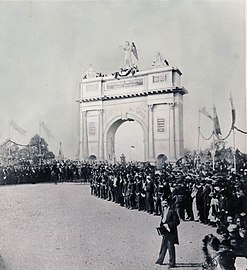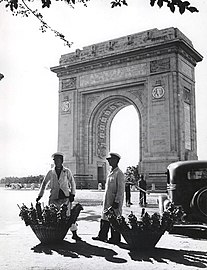Arcul de Triumf
| Arch of Triumph | |
|---|---|
| Romania | |
 | |
| For the Heroes of the War of Independence and World War I | |
| Unveiled | September 1936 |
| Location | 44°28′1.99″N 26°4′41.06″E / 44.4672194°N 26.0780722°ECoordinates: 44°28′1.99″N 26°4′41.06″E / 44.4672194°N 26.0780722°E near |
| Designed by | Petre Antonescu[1][2] |
Arcul de Triumf is a triumphal arch located in the northern part of Bucharest, on the Kiseleff Road.
The first, wooden, triumphal arch was built hurriedly, after Romania gained its independence (1878), so that the victorious troops could march under it. Another arch with concrete skeleton and plaster exterior of elaborate sculptures and decoration designed by Petre Antonescu was built on the same site after World War I in 1922. The arch exterior, which had seriously decayed, was replaced in 1935 by the current much more sober Neoclassical design, more closely modelled in the Arc de Triomphe in Paris. The new arch, also designed by Petre Antonescu and executed in stone, was inaugurated on 1 December 1936.
The arch has a height of 27 metres. It has as its foundation a 25 x 11.50 metres rectangle. The sculptures with which the facades are decorated were created by famous Romanian sculptors such as Ion Jalea and Dimitrie Paciurea.
Presently, military parades are held beneath the arch each 1 December, with the occasion of Romania's national holiday.
Elisabeta Palace, the current residence of the Romanian Royal Family, is located near the Arch of Triumph, in Herăstrău Park.
Gallery[]

Arcul de Triumf in 1878

Vendors near Arcul de Triumf, late 1930s

The symbol of the Royal Crown (the Romanian "Steel Crown"), depicted on the Eastern façade
See also[]
References[]
- ^ Sidonia Teodorescu (in Romanian). "Arhitectul Petre Antonescu (1873–1965)", in Studii și comunicări, vol. VIII/2015, pp. 381–396
- ^ (in Romanian) Vă mai amintiţi de: Petre Antonescu, Adevărul, 14 December 2010. Retrieved 2018-12-15
- Terminating vistas
- Triumphal arches in Romania
- Monuments and memorials in Bucharest
- World War I memorials in Romania
- Historic monuments in Bucharest
- Buildings and structures completed in 1936
- 1936 sculptures
- Greater Romania



